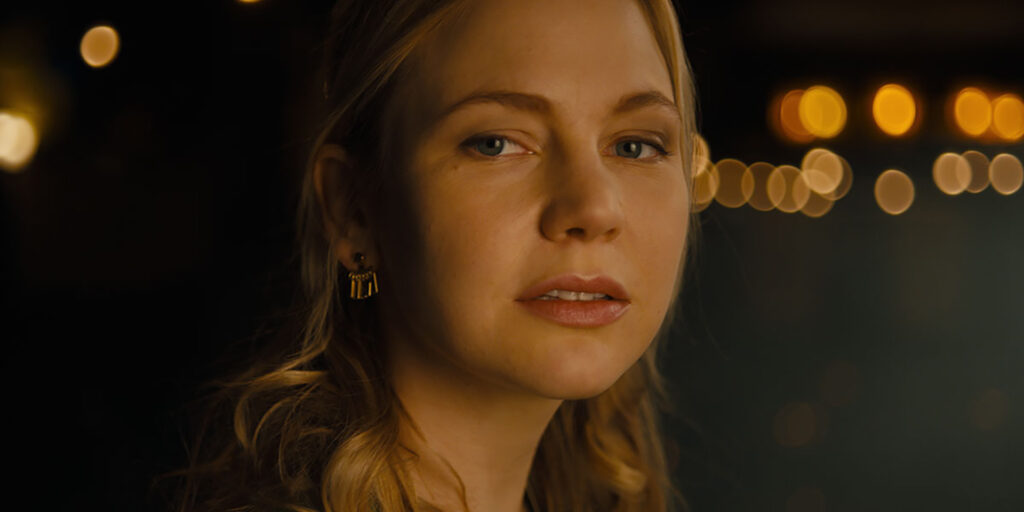Lindsay MacKay is a writer and director. MacKay is a graduate of the York University Film program and went on to get her Masters in Directing from the AFI Conservatory. Her debut feature, “Wet Bum,” premiered at TIFF in 2014. She is currently developing “Mersea,” based on her award-winning AFI thesis film “Clear Blue,” which participated in TIFF Writer’s Lab, Frontières Forum, and Berlin Co-Pro Market.
“The Swearing Jar” is screening at the 2022 Toronto International Film Festival, which is running from September 8-18.
W&H: Describe the film for us in your own words.
LM: This is really a film about the past and present, and how those two things intertwine in all sorts of ways. The story comes together slowly, like puzzle pieces. With each piece, we understand our characters a little more and are drawn a little deeper into their story.
W&H: What drew you to this story?
LM: First, it was Kate Hewlett’s wonderful script. It was a page-turner and the characters really came to life on the page.
Also, as the story unfolded I began to realize I had an immediate personal connection to the material, so I was excited to dive into something that felt so close to home.
W&H: What do you want people to think about after they watch the film?
LM: How incredible Adelaide Clemen’s performance was. She is a total powerhouse. Brilliant actor, singer, and on top of all that a really beautiful soul.
I also want them to think about how complicated life can be. We all need to give ourselves a little extra forgiveness in this crazy world.
W&H: What was the biggest challenge in making the film?
LM: As with all low-budget features, time is always the biggest challenge. You’re always working against the clock. The pandemic meant we didn’t get much rehearsal time, so we were thrown right into it. There was a lot of trust involved, and figuring things out on the fly.
W&H: How did you get your film funded? Share some insights into how you got the film made.
LM: We’re lucky in Canada with government organizations that support the arts. We were [supported by] Telefilm, Bell/Crave, Ontario Creates, and Manitoba and federal tax credits. Having said that, the budget was still tight for what we were trying to achieve, so we stretched every penny to pull it off.
W&H: What inspired you to become a filmmaker?
LM: Storytelling. I love good stories and how they tap into the essential parts of being human. We are a society that both thrives on and is destroyed by the stories we tell one another and that’s both an exciting and terrifying place to be.
As I move forward, I hope to be on the side that provides more meaning and understanding of the human experience through the stories I choose to tell.
W&H: What’s the best and worst advice you’ve received?
LM: I’m not sure if this counts as bad advice but I once had one prominent gatekeeper turn me down for funding on a project because it wasn’t “the kind of movie I should be making.” That really boiled my blood. It was a thriller I was genuinely excited to make, and honestly still am. There isn’t one kind of movie that a director should or shouldn’t be making. The film you are most excited about is the one you should make. Maybe that’s good advice?
W&H: What advice do you have for other women directors?
LM: Do it. Just go out and do it. Put in the work, and prepare for lots of disappointment – in yourself, in others, in the projects. Then keep doing it.
Also, find the people who keep you honest, challenge you, and push you to keep growing as an artist.
Watch movies, ask questions, and always be learning. There is so much to learn from other filmmakers and creatives so be open and ask questions.
W&H: Name your favorite woman-directed film and why.
LM: It’s always shifting as I see more and more female filmmakers evolve and make great work, but initially it was Lynne Ramsay and Andrea Arnold who both really inspired me with the way they told stories. They had a sensitivity to their work that really drew me in. The way they seemed to get into their main characters mind and showcase their complexity was what drew me to their work. I also enjoyed how they used the camera – it didn’t seem as cookie cutter as other work I had seen. It was emotional and another layer to the storytelling!
W&H: What, if any, responsibilities do you think storytellers have to confront the tumult in the world, from the pandemic to the loss of abortion rights and systemic violence?
LM: I think that’s what the arts and filmmaking are – they attempt to be a window into other peoples circumstances or shine a light on issues and bring humanity to subjects and subject matter through reflecting ourself back to each other. So, to sum up, I think you have to be aware of the message you are putting out into the world and hopefully lead with compassion.
W&H: The film industry has a long history of underrepresenting people of color onscreen and behind the scenes and reinforcing — and creating — negative stereotypes. What actions do you think need to be taken to make it more inclusive?
LM: Thankfully, in the last few years I think the industry has made large strides in the right direction on this issue. There is still work to be done and we can’t get complacent, but you definitely see the landscape shifting.
I can’t pretend to know how to solve this issue — all I can do is ask better of the people that employ me or fund my work and that is something I will continue to do.







